(DCT) The Dot Counting Test
(DCT) The Dot Counting Test
From $48.00
To $570.00
In stock
Sign In to download sample materials.
Don't have an account? Register Here.
About This Product

BY KYLE BOONE, PHD, PO LU, PSYD, AND DAVID HERZBERG, PHD
The Dot Counting Test (DCT) is a brief task that assesses test-taking effort in individuals ages 17 and older. This convenient instrument allows you to detect lack of effort on cognitive measures, whether it is intentional (malingering) or unintentional (unconscious).
The DCT measures an "overlearned" skill that is preserved in all but the most severe brain injuries. Because of this, a poor performance on the DCT suggests lack of effort. A validity study reported in the manual compared the DCT scores of 85 "suspect effort" patients (previously identified as "under attemptors" by rigorous inclusion and exclusion criteria) to those of patients in seven "normal effort" diagnostic groups: Depression, Schizophrenia, Head Injury, Stroke, Learning Disability, Mild Dementia, and Nonclinical. This study verified the ability of the DCT to discriminate among patients based on their effort status.
In interpreting DCT results, you can select a cutoff score that minimizes false positives while maintaining adequate sensitivity to "suspect effort." Simply compare the patient's performance to that of a similar reference group.
The DCT is highly useful in any setting where examinees have external incentives to fabricate or exaggerate cognitive problems--personal injury litigation, disability evaluations, and criminal cases, for example. The test's usefulness, however, reaches far beyond these situations. Routine assessment of effort often reveals unexpected features of other clinical complaints. For instance, patients who fail effort tests are sometimes found to have factitious or somatoform disorders. Even patients who have legitimate brain injuries sometimes exaggerate existing problems or fabricate new symptoms to ensure that their complaints are taken seriously.
Administered and scored in less than 10 minutes, the DCT can easily be added to routine assessment practice, rather than limited to forensic and disability cases. Its value in research is also apparent, especially in studies focusing on disorders that can't be independently confirmed through laboratory or imaging tests.
WPS Test Security Position Statement
A psychologist shall not reproduce or describe in public or in publications subject to general public distribution any psychological tests or other assessment devices, the value of which depends in whole or in part on the naivete of the subject, in ways that might invalidate the techniques; and shall limit access to such tests or devices to persons with professional interests who will safeguard their use.





